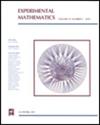Gelfand-Dorfman代数的特殊恒等式
IF 0.9
4区 数学
Q2 MATHEMATICS
引用次数: 13
摘要
如果Gelfand-Dorfman代数(gd -代数)可以嵌入到微分泊松代数中,那么它就是特殊代数。在本文中,我们证明了所有特殊的gd -代数的类在同态上是闭的,从而形成了一个变种。我们描述了一种寻找可能所有的gd -代数特殊恒等式的技术,并以此方法导出了两个已知的4次特殊恒等式。通过计算相应shuffle操作的Gröbner基,我们证明了这两个恒等式包含了5次以下的所有特殊恒等式。本文章由计算机程序翻译,如有差异,请以英文原文为准。
On the Special Identities of Gelfand–Dorfman Algebras
Abstract
A Gelfand–Dorfman algebra (GD-algebra) is said to be special if it can be embedded into a differential Poisson algebra. In this paper, we prove that the class of all special GD-algebras is closed with respect to homomorphisms and thus forms a variety. We describe a technique for finding potentially all special identities of GD-algebras and derive two known special identities of degree 4 in this way. By computing the Gröbner basis for the corresponding shuffle operad, we show that these two identities imply all special ones up to degree 5.
求助全文
通过发布文献求助,成功后即可免费获取论文全文。
去求助
来源期刊

Experimental Mathematics
数学-数学
CiteScore
1.70
自引率
0.00%
发文量
23
审稿时长
>12 weeks
期刊介绍:
Experimental Mathematics publishes original papers featuring formal results inspired by experimentation, conjectures suggested by experiments, and data supporting significant hypotheses.
Experiment has always been, and increasingly is, an important method of mathematical discovery. (Gauss declared that his way of arriving at mathematical truths was "through systematic experimentation.") Yet this tends to be concealed by the tradition of presenting only elegant, fully developed, and rigorous results.
Experimental Mathematics was founded in the belief that theory and experiment feed on each other, and that the mathematical community stands to benefit from a more complete exposure to the experimental process. The early sharing of insights increases the possibility that they will lead to theorems: An interesting conjecture is often formulated by a researcher who lacks the techniques to formalize a proof, while those who have the techniques at their fingertips have been looking elsewhere. Even when the person who had the initial insight goes on to find a proof, a discussion of the heuristic process can be of help, or at least of interest, to other researchers. There is value not only in the discovery itself, but also in the road that leads to it.
 求助内容:
求助内容: 应助结果提醒方式:
应助结果提醒方式:


